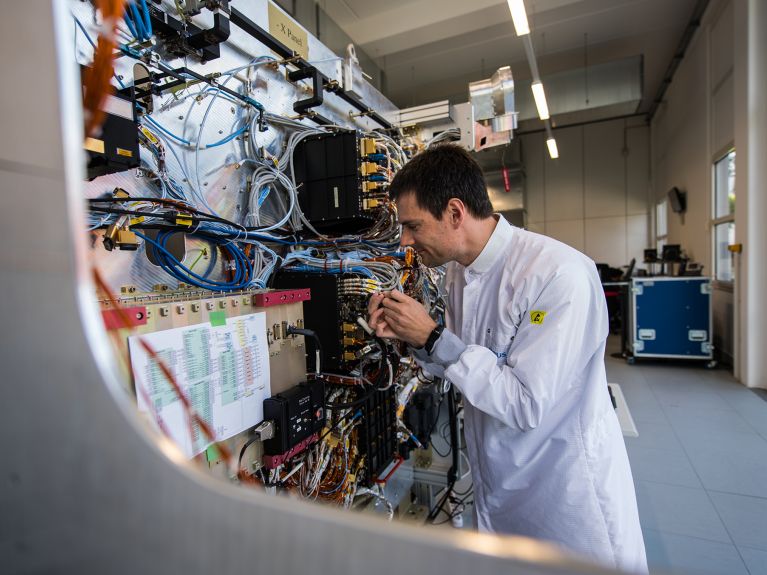Make it in Germany – the portal for skilled professionals
Anyone wishing to live and work in Germany will find the support they need here.

At the German Economic Institute in Cologne, Kerstin Krey is responsible for the “Make it in Germany” platform. She explains how the platform that was established in 2012 can help, and whom.
Ms Krey, what is Make it in Germany?
Make it in Germany is the central and official portal for skilled professionals from abroad who wish to come and work in Germany. Here they can find all of the information they need: the qualifications that are in demand, how to enter Germany, and which formalities they will need to observe. What is more, our portal also helps employers in Germany to find suitable foreign professionals. We want to make it as easy as possible for skilled migrants to come to Germany, and to show them that Germany is a great place to work, and of course to live...

What kinds of skilled workers are especially sought-after in Germany?
Fundamentally, all sectors are searching high and low for specialist personnel. As a result of the energy transition in Germany, heating engineering and heating technology specialists are in particularly high demand here at the moment – in other words, engineers and fitters in the skilled trades. There also continues to be a high demand for engineers with university degrees and graduates in the so-called MINT subjects (mathematics, informatics, natural sciences and technology). The healthcare sector needs nurses and doctors. Since the pandemic staff shortages also exist in the hotel and restaurant sectors and in the logistics industry. All these sectors are actively seeking personnel.
Which parts of the world do the highest numbers of interested parties come from and where does Germany try to recruit most intensively?
Both of these actually coincide. This is the case because people from countries that already have a large community in Germany are more likely to think of looking for work in the country as a result of contacts here. This applies to India, for example, with regard to engineering professions and IT. In the United States, for example, Germany has a particularly good reputation when it comes to mechanical engineering and the auto industry. The same applies to Mexico as a country of origin for engineers and doctors.
What is Germany’s good reputation based on?
On one hand, of course, it’s based on the fact that workers are highly sought-after and well paid here. On the other hand, Germany’s good working conditions also exert considerable pull. Various laws protect employees’ rights, there are regulated working hours and the protection of mothers, fathers and families is enshrined in law. Furthermore, occupational safety – in other words, safety at work – is valued very highly here. That means the highest standards apply in comparison to other countries, which makes Germany very attractive for employees.
In other words, Germany is recruiting employees all over the world?
Above all, it is important that we recruit in a socially responsible way. As a result, we don’t try to do that everywhere. Take the healthcare sector, for example: it goes without saying that we do not attempt to recruit medical personnel in regions where there are shortages of doctors or nursing staff. We fully comply with the rules of the World Health Organization (WHO) here. Since the beginning of the pandemic, for example, we have not attempted to recruit at all across the entire healthcare sector. We uphold the principle that no employees are recruited from regions where they would be missed. In most cases we communicate with the labour administrations of the countries concerned, something the Federal Employment Agency does regularly. We usually recruit where there is a surplus of young people who are qualified in a specific field.

In other words, if you find an employer, you’ve made it?
Not quite. One last hurdle, which we help people to overcome, is the recognition process for professional qualifications. On one hand, that’s not so easy because of Germany’s high standards compared to other countries, while, on the other, German states also have different requirements. Things are not so hard in the case of graduates, because university degrees can be compared relatively easily and we have many years of experience in that area. Examining vocational qualifications is more difficult because the dual system of vocational training that is normal in Germany only exists in a very few other countries. We try to help in all areas and put specialists in touch with the right contact partners. If the website can’t provide further help, we have a hotline that people can phone or contact via online chat or email. It provides knowledgeable answers to even the most specific and personal questions.
What differentiates Make it in Germany from normal – and commercial – employment websites?
We don’t see ourselves purely as a job website, but more as a website for skilled immigration. That means we try to explain to people how they can make their way to Germany, what regulations there are and which requirements they need to meet. That’s why we developed the Quick-Check function that enables all interested parties to answer a few questions on the Internet and then see what they need to have, what requirements they need to meet and what steps they need to take to come to Germany.
You would like to receive regular information about Germany? Subscribe here:


